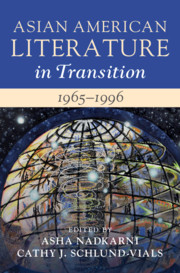Book contents
- Asian American Literature in Transition, 1965–1996
- Asian American Literature In Transition
- Asian American Literature in Transition, 1965–1996
- Copyright page
- Contents
- Contributors
- Series Preface
- Introduction
- Part I Immigration, Migration, and Movement
- Part II Politics, Art, and Activism
- Chapter 5 Furious Dialectics: Diasporic Anger in the Poetry of Li-Young Lee
- Chapter 6 Asian American Literature and the Vietnam War
- Chapter 7 Cross-racial Solidarities and Asian American Literature
- Chapter 8 Re/collecting Asian American Performance
- Chapter 9 Multiculturalism and Its Discontents
- Part III Institutionalization and Canon Formation
- Part IV Diaspora and the Transnational Turn
- References
- Index
Chapter 7 - Cross-racial Solidarities and Asian American Literature
from Part II - Politics, Art, and Activism
Published online by Cambridge University Press: 08 June 2021
- Asian American Literature in Transition, 1965–1996
- Asian American Literature In Transition
- Asian American Literature in Transition, 1965–1996
- Copyright page
- Contents
- Contributors
- Series Preface
- Introduction
- Part I Immigration, Migration, and Movement
- Part II Politics, Art, and Activism
- Chapter 5 Furious Dialectics: Diasporic Anger in the Poetry of Li-Young Lee
- Chapter 6 Asian American Literature and the Vietnam War
- Chapter 7 Cross-racial Solidarities and Asian American Literature
- Chapter 8 Re/collecting Asian American Performance
- Chapter 9 Multiculturalism and Its Discontents
- Part III Institutionalization and Canon Formation
- Part IV Diaspora and the Transnational Turn
- References
- Index
Summary
Instead of assuming it as a given or an inherent good, this chapter examines cross-racial solidarity in Asian American literature through an emphasis on what historian David Roediger calls “productive uneasiness over solidarity.” It focuses on three flashpoints of racial consciousness: (1) post-civil rights reckonings of Japanese American incarceration, (2) the cultural nationalist search for Asian American identity, and (3) reflections on the Asian American social and political position after the 1992 Los Angeles uprising. These flashpoints encouraged Asian American writers to envision commonalities across racial difference and notice singularities that bespeak the construction of Asian racial difference. Asian American literature’s “productive uneasiness over solidarity” appears in the process of seeing and articulating these commonalities and singularities, not as fixed products but as fluctuating and shifting processes. As writers ask probing questions about Asian American identities and identification, Asian American literature brings into focus both a historical Black–white racial binary and a new but vexing multiculturalism as the fulcra of imagining cross-racial solidarity.
Keywords
- Type
- Chapter
- Information
- Asian American Literature in Transition, 1965–1996 , pp. 126 - 143Publisher: Cambridge University PressPrint publication year: 2021

